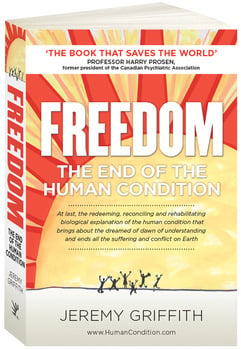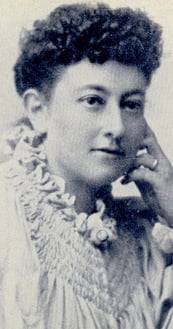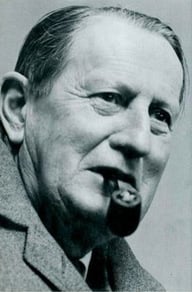Please note, links to all the Freedom Essays are included at the end of this essay. Open any essay to read, print, download, share or listen to (as an audio).
Freedom Essay 46
Anne Frank’s and Olive Schreiner’s vision
of a human-condition-resolved peaceful
world, and counsel from others, like
Sir James Darling, who stressed the
desperate need for that breakthrough
Written by Jeremy Griffith, 2017
Anne Frank’s belief that peace would one day come to the human race
In spite of everything I still believe that people are really good at heart… I see the world gradually being turned into a wilderness, I hear the ever approaching thunder, which will destroy us too, I can feel the sufferings of millions and yet, if I look up into the heavens, I think that it will all come right, that this cruelty too will end, and that peace and tranquility will return again.
(Anne Frank, The Diary of a Young Girl, 1947)
Despite facing unimaginable horrors brought about by our species’ capacity for destruction and depravity, the extraordinary diarist and Holocaust victim Anne Frank’s faith in the basic goodness of all humans remained intact.
In fact, in writing that ‘people are really good at heart’, Anne displayed the hope, faith and trust in our species’ goodness that has allowed humanity to carry on throughout its often violent history, a faith that has finally been borne out by science making it possible to explain the human condition (see THE Interview and Video/F. Essay 3). While not condoning ‘evil’ in any form, this explanation of why our species has been capable of such horrific behaviour as the Holocaust, reveals that humans are fundamentally good—in fact, not just good but the heroes of the story of life on Earth!
And most wonderful of all, this redeeming understanding actually brings an end to our insecurity-driven horrifically selfish, competitive and aggressive behaviour. It is the insight we have needed to rehabilitate and heal our species’ underlying psychosis. As the great psychoanalyst Carl Jung was fond of saying, ‘wholeness for humans depends on the ability to own our own shadow’.
Finally, able to understand and love the dark side of ourselves, we humans will no longer be angry, egocentric and alienated. Understanding is compassion, the truth sets us free from our psychosis. So this is the fulfilment of Anne Frank’s awesome vision that ‘this cruelty too will end, and that peace and tranquility will return’ to humankind.
Olive Schreiner’s belief that ‘somewhere, some time, some place’ the transformation of the human race would take place
The great South African writer Olive Schreiner expressed the same hope of our species’ eventual emancipation as Anne Frank when, on her deathbed in 1920, she wrote a deeply reflective essay titled Somewhere, Some Time, Some Place in which she was able to recall her childhood struggle with the issue of the human condition. She told how, as a little girl ‘not yet nine years old’, she was overcome with distress about all the selfishness, meanness and cruelty in the world. Remarkably, while Schreiner wasn’t able to find understanding of all the wrongness in human behaviour, she did manage to achieve, through the inspiring beauty of nature, some peace of mind by realising that a greater meaning did lie behind all the apparent wrongness and suffering in human life.
For brevity’s sake, these are the main passages from Schreiner’s incredible essay: ‘When a child, not yet nine years old, I walked out one morning along the mountain tops on which my home stood. The sun had not yet risen, and the mountain grass was heavy with dew…I walked till I came to a place where a little stream ran…I had got up so early because I had been awake much in the night and could not sleep longer. My heart was heavy; my physical heart seemed to have a pain in it, as if small, sharp crystals were cutting into it. All the world seemed wrong to me…Why did everyone press on everyone and try to make them do what they wanted? Why did the strong always crush the weak? Why did we hate and kill and torture? Why was it all as it was? Why had the world ever been made?…The little sharp crystals seemed to cut deeper into my heart.
And then, as I sat looking at [the stream]…the sun began to rise. It shot its lights across the long, grassy slopes of the mountains and struck…[a] little mound of earth [at the water’s edge]…All the…flowers and grasses on it turned bright gold, and the dewdrops hanging from them were like diamonds; and the water in the stream glinted as it ran. And, as I looked at that almost intolerable beauty, a curious feeling came over me…I seemed to see a world in which creatures no more hated and crushed, in which the strong helped the weak, and men understood each other, and forgave each other, and did not try to crush others, but to help…And there came to me, as I sat there, a joy such as never besides have I experienced…a joy without limit…
[T]his feeling [that] came to me, a feeling…not easy to put into words…was like this: You also are a part of the great Universe; what you strive for something strives for…you are moving on towards something…
In the long years which have passed, the adult has seen…the greed, the ambition, the cruelty and falsehood of the individual soul…in so hideously enlarged and wholly unrestrained a form that it might be forgiven to one who cried out to the powers that lie behind life: “Is it not possible to put out a sponge and wipe up humanity from the earth? It is stain!”…[Very honestly, Schreiner also conceded that even ‘Within my own soul I have perceived elements militating against all I hungered for’.] [She went on]…I have tried to wear no blinkers…I have tried to look nakedly in the face those facts which make most against all hope—and yet, in the darkest hour, the consciousness which I carried back with me that morning has never wholly deserted me…
That which was for the young child only a vision…has, in the course of a long life’s experience, become a hope…which a growing knowledge of human nature and human life does endorse. Somewhere, some time, some place’ (An Olive Schreiner Reader: Writings on Women and South Africa, ed. Carol Barash, 1987, pp.216-220 of 261).
I think that passage is as clean a take on the fundamental situation we humans have been in as you could hope to find.
Having, as Schreiner said, ‘tried to look nakedly in the face of those facts which’ seem unequivocally to deny ‘all hope’ of there being meaning in all the suffering and apparent wrongness in human life, she then, in that state of complete openness to all the possibilities, saw the sparkle on a stream in the early morning sunlight and, through that beauty, was connected to the greater truth that there is a purpose and destiny to human existence—that we have been ‘moving towards something’. That ‘something’, she said, was ‘a growing knowledge of human nature’ that will ‘somewhere, some time, some place’ bring about an incredible transformation of humans where ‘the strong helped the weak, and men understood each other, and forgave each other, and did not try to crush others, but to help’, and that the coming of that time would bring about ‘a joy without limit’.
Believe it or not, this ‘somewhere’ and ‘some time’ and ‘some place’ when ‘a growing knowledge of human nature’—science, in fact—would make possible reconciling, redeeming, healing and transforming understanding of ourselves—when, as Professor Harry Prosen said, ‘the psychological rehabilitation of the human race’ can begin—is happening right now, and right here in what you are reading in these Freedom Essays, and in their source, FREEDOM: The End Of The Human Condition.
Other deep thinkers, such as Sir James Darling, who have stressed the now desperate need for understanding of the human condition to be found
- ‘In the distant future I see open fields for far more important researches. Psychology will be based on a new foundation…Light will be thrown on the origin of man and his history’, Charles Darwin (The Origin of Species, 1859, p.458 of 476).
- ‘Philosophers and scientists have done very little to elucidate the problem of man…psychologists were wrong in assuming that man was a healthy creature, mainly conscious and intellectual, and should be studied from that point of view. Man is a sick being…The human soul is divided, an agonizing conflict between opposing elements is going on in it…the distinction between the conscious and the subconscious mind is fundamental for the new psychology’, Russian philosopher Nikolai Berdyaev (The Destiny of Man, 1931; tr. N. Duddington, 1960, pp. 49 & 67-68 of 310).
- ‘We are living through deeply anxious days, and if we are to relieve our anxiety we must diagnose its cause…What is the meaning of man? To this question no answer is being offered, and I have the feeling that we are moving toward the darkest era our world has ever know’, French writer Antoine de Saint-Exupéry (A Sense of Life, 1965, pp.127, 219 of 231).
- ‘Our alienation goes to the roots. The realization of this is the essential springboard for any serious reflection on any aspect of present inter-human life (p.12 of 156) …The condition of alienation, of being asleep, of being unconscious, of being out of one’s mind, is the condition of the normal man’ (p.24); and ‘The requirement of the present, the failure of the past, is the same: to provide a thoroughly self-conscious and self-critical human account of man’ (p.11); and ‘We respect the voyager, the explorer, the climber, the space man. It makes far more sense to me as a valid project—indeed, as a desperately urgently required project for our time—to explore the inner space and time of consciousness’ (p.105), Scottish psychiatrist R.D. Laing (The Politics of Experience and The Bird of Paradise, 1967).
- ‘We really know nothing about the nature of man, and unless we hurry to get to know ourselves we are in dangerous trouble’, Famous Swiss psychoanalyst Carl Jung, (Laurens van der Post, Jung and the Story of Our Time, 1976, p.239 of 275).
- ‘I am infinitely saddened to find myself suddenly surrounded in the west by a sense of terrible loss of nerve, a retreat from knowledge into – into what? Into…falsely profound questions about, Are we not really just animals at bottom; into extra-sensory perception and mystery. They do not lie along the line of what we are now able to know if we devote ourselves to it: an understanding of man himself. We are nature’s unique experiment to make the rational intelligence prove itself sounder than the reflex. Knowledge is our destiny. Self-knowledge, at last bringing together the experience of the arts and the explanations of science, waits ahead of us’, Polish-born English science historian Jacob Bronowski (The Ascent of Man, 1973, p.437 of 448).
- ‘The world is hurtling to catastrophe: from nuclear horrors, a wrecked ecosystem, 20 million dead each year from malnutrition, 600 million chronically hungry…All these crises are man made, their causes are psychological. The cures must come from this same source; which means the planet needs psychological maturity fast. We are locked in a race between self destruction and self discovery’, Australian journalist Richard Neville (Good Weekend, The Sydney Morning Herald, 14 Oct. 1986; see www.wtmsources.com/167.)
- Having written of a need ‘to find…a key to unravelling the mystery of the human condition’, the English explorer and philosopher Bruce Chatwin reported how in ‘London, 1970’, ‘At a public lecture I listened to Arthur Koestler airing his opinion that the human species was mad. He claimed that, as a result of an inadequate co-ordination between two areas of the brain—the “rational” neocortex and the “instinctual” hypothalamus—Man had somehow acquired the “unique, murderous, delusional streak” that propelled him, inevitably, to murder, to torture and to war’ (The Songlines, 1987, pp.77 & 237 of 325).
- ‘The human condition is the most important frontier of the natural sciences’; and ‘There is no grail more elusive or precious in the life of the mind than the key to understanding the human condition”, Renowned Harvard University-based American biologist Edward O. Wilson (Consilience, 1998, p.298 of 374; and The Social Conquest of Earth, 2012, p.1 of 330).
- In December 2012, American billionaire Mortimer B. Zuckerman pledged US$200 million to Columbia University, saying that: ‘At its root, this is an investment in accomplished scholars whose collective mission is both greater understanding of the human condition and the discovery of new cures for human suffering’ (The Educated Observer, Winter 2013).
- ‘Know then thyself, presume not God to scan / The proper study of Mankind is Man’, English poet Alexander Pope (Essay on Man, 1733).
- ‘Man, know thyself’, Famous ancient Greek maxim written on the Temple of Apollo at Delphi.
- ‘The world has achieved brilliance…without conscience. Ours is a world of nuclear giants and ethical infants’, The great American Second World War General Omar Bradley (Armistice Day Address, 10 Nov. 1948; Collected Writings of General Omar N. Bradley, Vol.1).
- ‘…humanity is either standing on the brink of “a quantum leap in human psychological capabilities or heading for a global nervous breakdown”’, American clinical psychologist Maureen O’Hara (Richard Eckersley, address titled ‘Values and Visions: Western Culture and Humanity’s Future’, Nov. 1995; see www.wtmsources.com/133)
- ‘Time may well be dwindling for us to enlighten ourselves…Tragic to die of thirst half a yard from the well’, Australian journalist Doug Anderson (The Sydney Morning Herald, 31 Oct. 1994).
- ‘The only good is knowledge and the only evil is ignorance’; and ‘The unexamined life is not worth living’, Ancient Greek philosopher considered to be the father of western philosophy, Socrates (Diogenes Laertius, Lives of Eminent Philosophers, c.225 AD; and Plato’s dialogue Apology, c.380 BC; tr. B. Jowett, 1871, 38).
- ‘I want you to go on to picture the enlightenment or ignorance of our human conditions somewhat as follows. Imagine an underground chamber, like a cave with an entrance open to the daylight and running a long way underground. In this chamber are men who have been prisoners there…think what would naturally happen to them if they were released from their bonds and cured of their delusions [by one day achieving the enlightenment…of our human condition]…don’t you think he [the cave prisoner] would congratulate himself on his good fortune’, Ancient Greek philosopher Plato (The Republic, c.360 BC; tr. H.D.P. Lee, 1955).
- ‘…symptoms of the mental disorder which appears to be endemic in our species…are specifically and uniquely human, and not found in any other species. Thus it seems only logical that our search for explanations [of human behaviour] should also concentrate primarily on those attributes of homo sapiens which are exclusively human and not shared by the rest of the animal kingdom. But however obvious this conclusion may seem, it runs counter to the prevailing reductionist trend. “Reductionism” is the philosophical belief that all human activities can be “reduced” to – i.e., explained by – the [non-psychosis involved] behavioural responses of lower animals – Pavlov’s dogs, Skinner’s rats and pigeons, Lorenz’s greylag geese, Morris’s hairless apes…That is why the scientific establishment has so pitifully failed to define the predicament of man’, Hungarian-born English scientist-philosopher Arthur Koestler (Janus: A Summing Up, 1978, p.19 of 354).
- ‘We have not overcome our condition, and yet we know it better. We know that we live in contradiction, but that we must refuse this contradiction and do what is needed to reduce it. Our task as men is to find those few first principles that will calm the infinite anguish of free souls. We must stitch up what has been torn apart, render justice imaginable in the world which is so obviously unjust, make happiness meaningful for nations poisoned by the misery of this century. Naturally, it is a superhuman task. But tasks are called superhuman when men take a long time to complete them, that is all’, Algerian-born French Nobel Laureate for Literature Albert Camus (The Almond Trees, 1940; in Summer, 1954, pp.33-35 of 87).
- ‘Getting to the root of the human condition is something I find not only fascinating, but absolutely necessary in understanding who we are…If we understand why we act the way we do, we can change the way we act’, Leading American filmmaker Steven Spielberg (in regard to his upcoming Discovery Channel documentary series Why We Hate, Variety.com, 6 Apr. 2018).
- ‘Only by understanding how we were all a part of the same contemporary pattern [of wars, cruelty and greed] could we defeat those dark forces with a true understanding of their nature and origin’ ; and, ‘Compassion leaves an indelible blueprint of the recognition that life so sorely needs between one individual and another; one nation and another; one culture and another. It is also valid for the road which our spirit should be building now for crossing the historical abyss that still separates us from a truly contemporary vision of life, and the increase of life and meaning that awaits us in the future’ Pre-eminent South African philosopher Sir Laurens van der Post (Jung and the Story of Our Time, 1976, pp.24 & 29 of 275)
To end this collection I’ll include some extracts from the speeches of the great English-born Australian educator Sir James Darling, who was my headmaster when I was a student at Geelong Grammar School (GGS) in Victoria, Australia (which, incidentally, was the school King Charles III was sent halfway around the world to attend): ‘How difficult it is for modern man to see life clearly and to see it whole. But…the scientist can no more deny or devaluate the truths of spiritual experience than the theologian can neglect the truths of science: and the two truths must be reconcilable, and it must be of importance to each of us that they should be reconciled…Only so can we come to a better understanding of life, to answer even the all-important question: “What is man that thou art mindful of him, and the son of man that thou visitest him?” [Why are humans fallible and not sound like Christ, which is the issue of the human condition.] For to exclude that question from the study of evolution is indeed to play Hamlet without the Prince of Denmark…There must be a complete answer; there must be coherence and sense in the universe; and, until we find it, our thinking is degenerated into disintegration, and our existence fragmented into a rubbish-heap of shreds and patches, with coherence, significance, and growth impossible, our compass-bearings lost, and civilization foundering’ (On Looking Beneath the Surface of Things oration, 1954; pub. in The Education of a Civilized Man, ed. M. Collins Persse, 1962, pp.68 & 74-75 of 223); and ‘The time is past for help which is only a Band-Aid. It is time for radical thinking and for a solution on the grand scale’ (Reflections for The Age, ed. J. Minchin & B. Porter, 1991, p.145 of 176); and ‘the future lies not with the predatory [selfish] and the immune [alienated] but with the sensitive [innocent/sound] who live dangerously [defy the world of denial]. It should be the prime object of education…to develop this sensitivity…the truly sensitive mind is both susceptible and penetrating: it is open to new ideas, and it seeks truth at the bottom of the well’ (On Looking Beneath the Surface of Things, pub. in The Education of a Civilized Man, pp.63-64); and ‘There are two attributes of leadership…to think independently and originally, and the instilling of the confidence and courage required from those who are going to take a line different from that of the majority’ (1960 GGS Speech Day address, pub. in The Education of a Civilized Man, p.98); and ‘This means, for every single man and woman here today, for every boy, however young, that he should here highly resolve that those whom we commemorate should not have died in vain. It means that each of us should regard our lives as pledged to the one paramount purpose of saving the world…The alternative is death, not only of the soul but of the body also, and the sands of time are running out (1961 GGS Anzac Day address, pub. in The Education of a Civilized Man, pp.139-140)’; and quoting Lord Tennyson, ‘We are not now that strength which in old days moved Heaven and Earth…but something ere the end, some work of noble note may yet be done’ (1950 GGS Speech Day address, pub. in Light Blue Down Under, Weston Bate, 1990, p.219 of 386).
Yes, as Sir James said, ‘There must be a complete answer’ and ‘until we find’ that ‘truth at the bottom of the well’ of understanding of the human condition ‘our existence [is] fragmented into a rubbish-heap’—so ‘The time is past for help which is only a Band-Aid. It is time for radical thinking and for a solution on the grand scale.’ And that ‘paramount purpose of saving the world’ that Sir James set his students to accomplish has been achieved with the publication of FREEDOM: The End Of The Human Condition!
- - - - - - - - - - - - - - - - - -
Watch Jeremy Griffith present the breakthrough redeeming explanation of the human condition in THE Interview; for a fuller explanation read chapter 3 of FREEDOM; and for a summary presentation of the key ‘instinct vs intellect’ explanation watch Video/F. Essay 3.
Discussion or comment on this essay is welcomed—see below.
Please Note, if you are online you can read, print, download or listen to (as a podcast) THE Interview, The Great Guilt, The Great Transformation, Sermon On The Beach or any of the following Freedom Essays by clicking on them below.
INTRODUCTION TO THE EXPLANATION & RESOLUTION OF THE HUMAN CONDITION: THE Interview That Solves The Human Condition And Saves The World! | The Great Guilt that causes the Deaf Effect | The Great Transformation: How understanding the human condition actually transforms the human race | Sermon On The Beach | Freedom Essay 1 Your block to the most wonderful of all gifts | 2 The false ‘savage instincts’ excuse | 3 THE EXPLANATION of the human condition | 4 The ‘instinct vs intellect’ explanation is obvious – short | 5 The transformation of the human race | 6 Wonderfully illuminating interview | 7 Praise from Prof. Prosen | 8 “How this ends racism forever” | 9 “This is the real liberation of women” | 10 What exactly is the human condition? | 11 The difficulty of reading FREEDOM and the solution | 12 One hour summarising talk | 13 The WTM Deaf Effect Course | 14 Dishonest biology leads to human extinction | 15 How your life can immediately be transformed | 16 The Shock Of Change | THE BOOKS: 17 Commendations & WTM Centres | 18 FREEDOM chapter synopses | 19 FREEDOM’s significance by Prof. Prosen | 20 The genius of Transform Your Life | THE OTHER KEY BIOLOGICAL EXPLANATIONS: 21 How did we humans acquire our altruistic moral conscience? | 22 Fossil discoveries evidence our nurtured origins | 23 Integrative Meaning or ‘God’ | 24 How did consciousness emerge in humans? | 25 The truthful biology of life | • Survey seeking feedback | MEN & WOMEN RECONCILED: 26 Men and women reconciled | 27 Human sex and relationships explained | THE END OF RACISM: 28 The end of racism | 29 Can conflict ever end? | RESIGNATION: 30 Resignation | 31 Wordsworth’s all-revealing great poem | MORE ON THE TRANSFORMATION: 32 More on the Transformation | 33 Jeremy on how to become transformed | THE END OF POLITICS: 34 This understanding ends the polarised world of politics | 35 Death by Dogma left-wing threat | 36 Saving Western civilisation from left-wing dogma | 37 The meaning of superhero and disaster films | RELIGION DECIPHERED: 38 Noah’s Ark explained | 39 Christ explained | 40 Judgment Day finally explained | 41 Science’s scorn of religion | MEANING OF ART & CULTURE: 42 Cave paintings | 43 Ceremonial masks explained | 44 Art makes the invisible visible | • Second survey seeking feedback | 45 Prophetic songs | 46 Anne Frank’s faith in human goodness fulfilled | 47 Humour and swearing explained | 48 R.D. Laing’s fearless honesty | ABOUT BIOLOGIST JEREMY GRIFFITH: 49 Jeremy’s biography | 50 Australia’s role | 51 Sir Laurens van der Post’s fabulous vision | 52 Jeremy’s children’s book A Perfect Life | 53 The ‘instinct vs intellect’ explanation is obvious – long | 54 The accusation of hubris | DO WE FAIL OR DO WE MAKE IT? 55 Endgame for the human race | 56 Why there have been ferocious attacks on the WTM | 57 Magnificence of the Transformed State – video 1 | 58 Magnificence of the Transformed State – video 2 | MARKETING: 59 Shouldn’t the WTM’s website be toned down? | 60 The crime of ‘ships at sea’ ‘pocketing the win’ | GENERAL DISCUSSIONS BY JEREMY: 61 General Discussion by Jeremy Aug. 2018 | 62 Jeremy’s Masterpiece Presentation Feb. 2019 | HEALTH & HEALING: 63 Pseudo therapy/healing | 64 Real therapy/healing | From here on are Transformation Affirmations and More Good Info Emails
These essays were created in 2017-2024 by Jeremy Griffith, Damon Isherwood, Fiona Cullen-Ward, Brony FitzGerald & Lee Jones of the Sydney World Transformation Movement Centre. All filming and editing of the videos was carried out by Sydney WTM members James Press & Tess Watson during 2017-2024. Other members of the Sydney WTM Centre are responsible for the distribution and marketing of the videos/essays, and for providing subscriber support.








Please wait while the comments load...
Comments